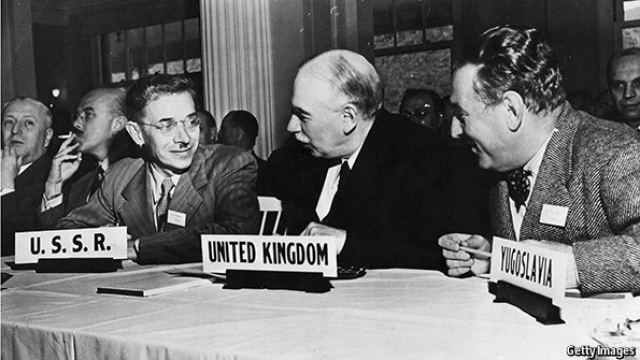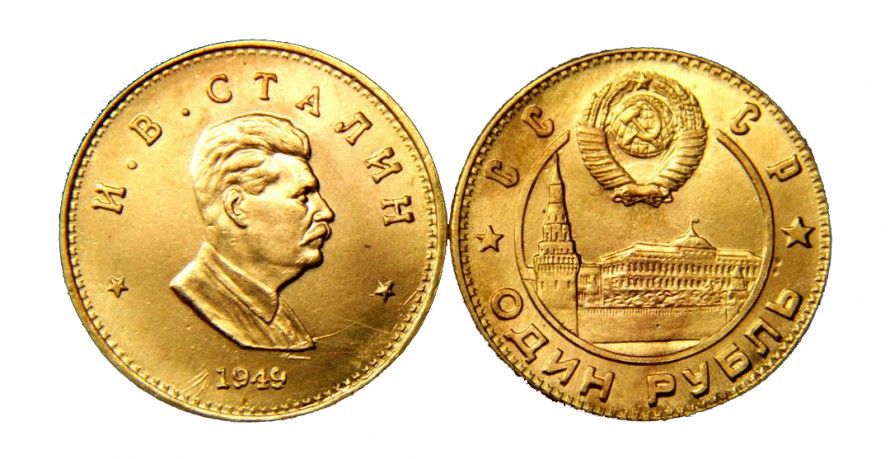There are a terrible lot of lies going about the world,
and the worst of it is that half of them are true.
Winston Churchill
These days, when a shocking number of people on this planet possess only the most rudimentary grasp of the history of World War II and devoutly believe that in that great confrontation, the US and Great Britain defeated some kind of general “totalitarianism,” many are alarmed by any hint of a discussion of the decisive role played by the USSR in vanquishing the Nazis. But today we’re actually going to take things a step further and demonstrate how Great Britain, which was one of the main orchestrators behind WWII, not only failed to win the war, it actually flat out lost it.
We have already shown how London and Washington’s primary goal in the debut of their Hitler project was to crush any potential competitors to the Anglo-Saxon currency and to create a new, dollar-based world. Yet what had they gained by the time Soviet troops captured the Reichstag in May of 1945?
Not one of London’s goals had been achieved.
They had played a sophisticated political game, nudging the Nazis into power and conceding half of Europe in order to play Germany off against Russia. It was a story of huge financial losses and brilliant secret operations. But in the end, Russian troops were stationed many hundreds of kilometers further west than they had been on Sept. 1, 1939. What would the shareholders in a European soccer club say if, after millions of euros and many years of recruiting, their new coach took that team from first place down to third? That’s how Great Britain’s ranking dropped after WWII. London had previously held the top spot both globally and in Europe. “There is no doubt from now onwards Russia is all-powerful in Europe,” wrote British Field Marshal Sir Alan Brooke in his diary in the spring of 1945.
Someone had to answer for this. Churchill had won the war in such a way that his victory was very reminiscent of defeat. As a result, instead of receiving an award for his triumph over Nazi Germany, Churchill was handed … a humiliating resignation.

July 1945. In the German city of Potsdam, the victors – the leaders of the conquering powers – were holding a conference. Stalin, Truman, and Churchill were seated at the negotiating table. And suddenly, in the middle of the conference, Churchill is forced out of office and has to go home. London offered to send him back to Potsdam as the deputy to the new prime minister – a man who had previously attended every conference in his role as Churchill’s deputy! Churchill felt crushed and bewildered. When the king offered him the Order of the Garter as a consolation prize, the former prime minister turned him down …
When studying the history of the Second World War, it is important to understand that Hitler nursed no plans to conquer the whole world. Meanwhile, the banking families that founded the Bank of England in 1694 and the Federal Reserve System in 1913 were confident that they stood at the threshold of world domination. Only one step remained – to force everyone to sign the Bretton Woods Agreement and make the dollar a surrogate for gold.
Everything possible seems to have been done to further this goal. During the war years, the United States of America had consolidated the bulk of the world’s gold reserves inside its own borders. Gold belonging to England, France, and other European countries migrated across the ocean. Much of Russia’s gold also sailed to the US. After all, lend-lease supplies, which is what American “aid” was called, weren’t handed out for free. Everything that the States shipped to the USSR was paid for in gold. Furthermore, the Russians who traded gold bars for weapons and food actually paid for those deliveries before the ships left their home harbor. The recipients bore the risk should any cargo be lost to German torpedoes or aircraft.
They did everything – yet nothing came of their efforts. One-sixth of the Earth’s land surface, in addition to half of Europe, remained outside the dollar zone. Soviet tanks were parked in Berlin, and all of Eastern Europe became a sphere of Russian influence. This was historically unprecedented – the Russian army had never been so powerful under any of its tsars. Czechoslovakia, Romania, Albania, and Yugoslavia had never been obedient allies of Moscow. So what else did Sir Winston deserve in return for such a “successful” policy, apart from his resignation?
***
The Bretton Woods Agreement was scheduled to be ratified in December 1945. The USSR, which had been fully engaged in the July 1944 conference in Bretton Woods, was far from satisfied with the outcome.

As a reminder, the key decisions of Bretton Woods were:
– the creation of a new global financial system dominated by the Federal Reserve’s dollar – which was securely tied to gold – acting as the primary reserve currency
– the establishment of the International Monetary Fund (IMF), which holds both immunity from prosecution in all countries as well as the authority to obtain any information of interest about a country’s financial situation
– the creation of a central bank in each country, controlled by the IMF (they are virtually branches of the Federal Reserve System) and which does not have the right to freely issue its own national currency
– the allocation of IMF quotas in such a way that the US and Great Britain were given the controlling stake necessary to ensure full control over the Fund’s activities (the US was assigned a quota of 2,750 million SDRs under the original articles of agreement, and Great Britain was given 1,300, while the USSR received only 1,200)
– two years later, within the framework of the Bretton Woods Agreement, the General Agreement on Tariffs and Trade (the GATT was the prototype for the future WTO) was reached, with the goal of expanding the markets for US goods that are sold for dollars
Thus, the intention of Bretton Woods was to create a system in which some (the owners of the Fed) print money, in exchange for which everyone else saves up their own cash and sells all their valuables and resources.
Despite staggering pressure (Truman’s notification to Stalin that nuclear weapons had been dropped on Hiroshima and Nagasaki was only one installment in this program of pressure), the USSR refused to ratify the one-sided Bretton Woods Agreement, and it took effect on Dec. 27, 1945, without the cooperation of the USSR or the countries within the Soviet orbit.
But the true era of the dollar – the period during which it held unfathomable power – would not begin until 46 years later than scheduled, i.e., only after the collapse of the USSR in 1991. For four and a half decades the Soviet Union stood firm against this cancerous tumor of money created out of thin air, establishing an alternative economy and an entirely new civilization. When Roosevelt died in 1945, Stalin was out of the reach of the bankers’ power, and they had to subject only Churchill to a public whipping …
***

On March 5, 1946, Churchill gave his famous speech in Fulton, Missouri. He devoted several months to preparing it. He spent the whole winter of 1945-1946 in the US, where he and President Truman sat together and came up with his main talking points. Then he made his way to a resort in Florida, where he perfected and polished the text for several weeks. In other words, his preparations for his March speech began back in late 1945, when it became clear that the USSR would not ratify the Bretton Woods Agreement and was not about to subordinate its financial system to the Fed.
It was not some kind of “tyranny” or “dictatorship” in the USSR that sparked Churchill’s burning desire to present a key policy document, which his speech at Westminster College turned out to be, but rather Stalin’s refusal to surrender the USSR to the “printing press.”
As an aside, it’s interesting to note that Churchill actually borrowed his famous “iron curtain” phrase from … Joseph Goebbels, who coined this new expression in an editorial in the newspaper Das Reich on Feb. 25, 1945. But we are less interested in who owns the copyright to such a lovely turn of speech than in a purely pragmatic clarification: from which side did the notorious iron curtain descend?
Stalin’s response to Churchill’s speech was quite illuminating.
“Actually, Mr. Churchill, and his friends in Britain and the United States, present to the non-English speaking nations something in the nature of an ultimatum: ‘Accept our rule voluntarily, and then all will be well; otherwise war is inevitable’ … But nations have shed their blood in the course of five years of cruel war for the freedom and independence of their countries and not to exchange domination by Hitler for domination by Churchill. It is wholly probable, therefore, that the non-English-speaking nations, which include the great majority of the population of the world, will not agree to accept a new slavery.”

***
Paying no mind to pressure from abroad, the USSR was busy rebuilding its country after the devastation of war. On Aug. 29, 1949, a Soviet atomic bomb was tested. Now Stalin could sigh with relief – he need no longer fear a nuclear strike from the “printing press.” And on Feb. 28, 1950, the Soviet Council of Ministers issued a stunning decree:
“… The Soviet Government has recognized the need to raise the official exchange rate of the ruble, and to calculate the ruble’s exchange rate based not on the US dollar, as was established in July 1937, but on the more stable basis of gold, in accordance with the gold content of the ruble.
Working from this premise, the USSR Council of Ministers has decreed:
1. As of March 1, 1950, to no longer use the dollar to determine the ruble’s exchange rate against foreign currencies, but to move to a more stable basis of gold, in accordance with the gold content of the ruble
2. To set the gold content of the ruble at 0.222168 grams of pure gold
3. As of March 1, 1950, to set the USSR State Bank’s purchasing price for gold at four rubles and 45 kopecks per one gram of pure gold
4. As of March 1, 1950, to set the exchange rate of the ruble in relation to major foreign currencies on the basis of the gold content of the ruble, as established in article 2:
at four rubles for one American dollar instead of the current rate of five rubles and 30 kopecks
In the event of any further changes to the gold content of foreign currencies or changes to their exchange rates, the State Bank of the USSR shall set the exchange rate of the ruble in relation to foreign currencies with due account for these changes.”
A challenge had been issued. Other than the dollar, the Soviet ruble was now the only currency in the world that was directly tied to gold. Stalin created a currency and payment system that served as an alternative to the Anglo-Saxon version. But he did this only after providing his country with a nuclear shield. Without giving in to pressure, he created a state-level competitor to the Federal Reserve and Bank of England. All that remained was to expand this payment system and begin to give the “printing press” some real competition. After all, the idea behind money is simple – if it is accepted, it is in demand. Thus, demand is essential. Just as the US had worked to generate demand for the dollar, so Stalin began to do this for the ruble. The USSR began conducting its foreign trade in golden rubles or in gold, but under no circumstances in dollars!
The CMEA (Council for Mutual Economic Assistance) had been established a few years prior, in 1949, and its members began trading with one another using golden rubles, as well as with China, Mongolia, North Korea, Vietnam, and many developing countries. A massive economic continent was created, where the dollar could not enter.  In 1952, Moscow hosted a conference for developing nations and even a number of capitalist countries (Sweden, Finland, Iceland, Austria, Switzerland, and Ireland). The proposal from Stalin’s Russia sounded the death knell for the bankers’ plans for global expansion: “… mutually agreed foreign-trade prices, the development of foreign trade based on barter (commodity exchange) … the creation of a common interstate currency with a mandatory gold content. This, in turn, will accelerate the ‘undollarized,’ genuinely equitable economic integration of people’s democracies with the formerly colonial (i.e., developing) states. And those capitalist countries that are not interested in ‘dollarization’ may join this integration, in some form …”
In 1952, Moscow hosted a conference for developing nations and even a number of capitalist countries (Sweden, Finland, Iceland, Austria, Switzerland, and Ireland). The proposal from Stalin’s Russia sounded the death knell for the bankers’ plans for global expansion: “… mutually agreed foreign-trade prices, the development of foreign trade based on barter (commodity exchange) … the creation of a common interstate currency with a mandatory gold content. This, in turn, will accelerate the ‘undollarized,’ genuinely equitable economic integration of people’s democracies with the formerly colonial (i.e., developing) states. And those capitalist countries that are not interested in ‘dollarization’ may join this integration, in some form …”
***
This is now the time to think about Winston Churchill. We do not remember him as an eccentric failure, but as a victor and hero. But it was not winning the Second World War that made him thus. He was given a second chance and offered an opportunity to correct where he had been remiss. This opportunity was extended only because the “printing press” had not managed to find a more capable public figure. In 1951, Churchill once again became prime minister of Great Britain. And he began to work assiduously to rectify his own errors. This time he was completely rehabilitated and was even given an award. And I do not mean the Nobel Prize for Literature for his book about WWII. In April 1953, Winston Churchill was knighted. It was the same Order of the Garter that he had turned down after his first term as PM. That ceremony took place one month after Stalin’s puzzling death. But the mystery of who played on the ambitions, vanity, and stupidity of individual Communist Party functionaries in the USSR (and how) is the subject for an entirely different investigation.
The presented text was taken from the book by the Russian historian, writer and political activist Nikolay Starikov “Nationalization of Rouble“, St.Petersburg, 2012. Adapted and translated by ORIENTAL REVIEW.
Reposts are welcomed with the reference to ORIENTAL REVIEW.
PREVIOUS EPISODES
Episode 18. How Britain assisted the Soviet Union’s fight against Hitler
Episode 17. Britain – Adolf Hitler’s star-crossed love
Episode 16. Who signed death sentence to France in 1940?
Episode 14. How Adolf Hitler turned to be a “defiant aggressor”
Episode 13. Why London presented Hitler with Vienna and Prague
Episode 12. Why did Britain and the United States have no desire to prevent WWII?
Episode 11. A Soviet Quarter Century (1930-1955)
Episode 10. Who Organised the Famine in the USSR in 1932-1933?
Episode 9. How the British “Liberated” Greece
Episode 7. Britain and France Planned to Assault Soviet Union in 1940
Episode 6. Leon Trotsky, Father of German Nazism
Episode 5. Who paid for World War II?
Episode 4. Who ignited First World War?
Episode 3. Assassination in Sarajevo
















Pingback: L’Europe d’une guerre à l’autre : Comment Churchill a perdu et récupéré sa victoire dans la Seconde Guerre Mondiale. Épisode 19. | Réseau International
Pingback: L’Europe d’une guerre à l’autre (XIX) – Comment Churchill a perdu et récupéré sa victoire dans la Seconde Guerre Mondiale | Réseau International
Pingback: Episode 20. Who put up the Berlin Wall? | OrientalReview.org
Pingback: L’Europe d’une guerre à l’autre (XX) – Qui a posé le mur de Berlin? | Réseau International
Pingback: L’Europe d’une guerre à l’autre (XX) – Qui a posé le mur de Berlin ? | AXE DE LA RESISTANCE
Pingback: Who Really Put up the Berlin Wall?-Times of News Russia
Pingback: Who really put up the Berlin Wall? |
Pingback: Who Really Put up the Berlin Wall? - The Daily Coin
Pingback: L’histoire redressée : qui a vraiment voulu le mur de Berlin ? – Le Saker Francophone – DE LA GRANDE VADROUILLE A LA LONGUE MARGE
Pingback: Ursachen und Wahrheiten für das Ende der DDR – Dr. Wolf Barth